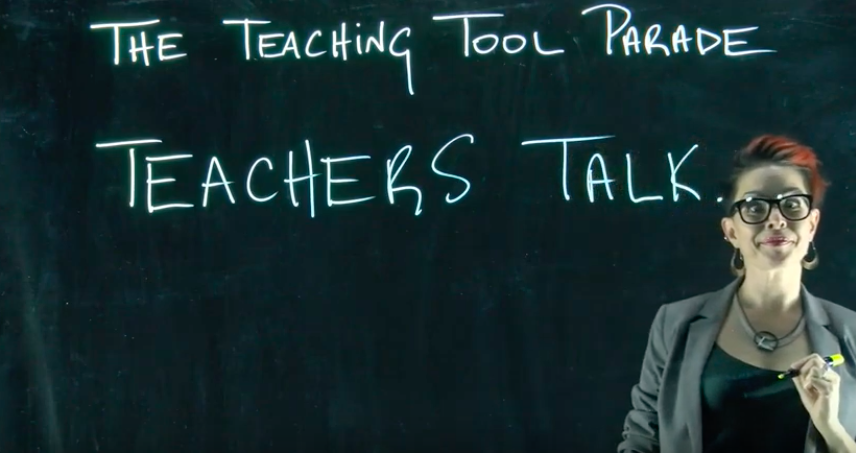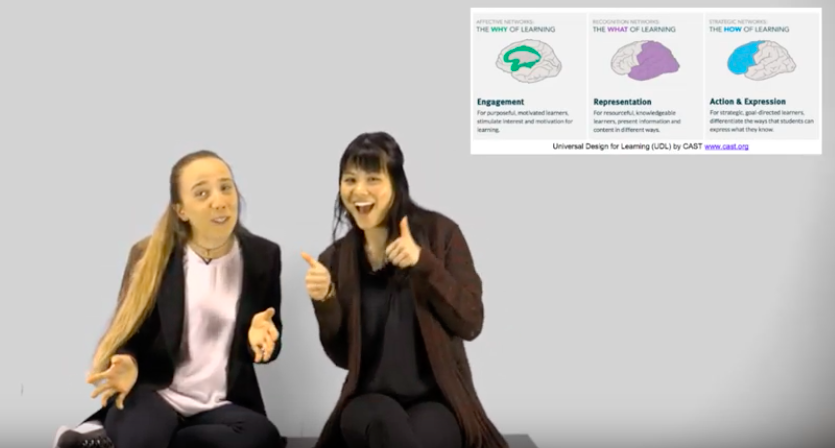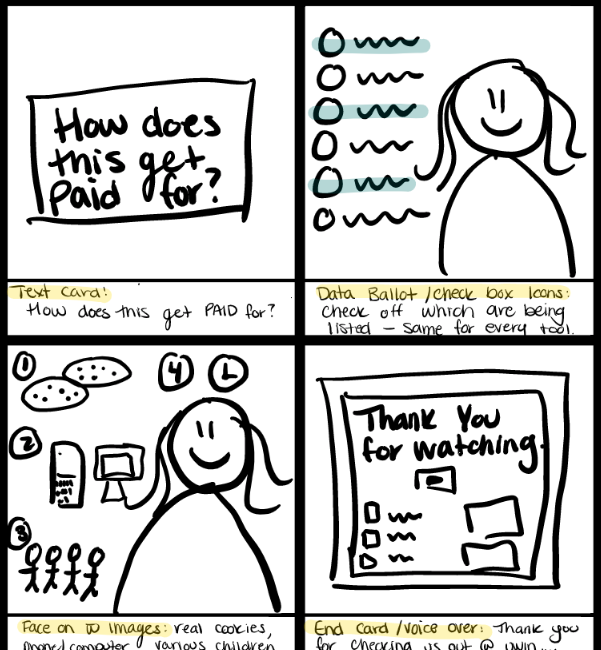I have a new project I’m really excited about. Even if it kinda goes against just about EVERYTHING I’ve said about tech in education over the past, uh, decade.
It’s a Tool Parade. At least on the surface. I’m marshalling the #UWinToolParade with three – soon to be four – brilliant and creative B.Ed students at the University of Windsor, thanks to (yay!) grants from our Office of Open Learning and Centre for Teaching & Learning.
And yep, we’re talking about tools. And tech platforms.

Apparently my “fun” face & my “deranged” face aren’t as distinct as they, um, could be)
***
I have opened just about every tech course and tech talk and tech workshop that I’ve given for YEARS with the caveat that I don’t talk about tech platforms, really. Or stand-alone tools. I talk about thinking tools for dealing with the digital. I talk about pedagogy. Or andragogy. Or heutagogy. But not about tools as shiny-things-by-themselves, decoupled from sociocultural and sociotechnical analysis.
I still stand by that. I think platforms are, socioculturally, a major problem. They mine data. They undermine democracy. Youtube just announced yesterday that homophobic slurs don’t violate its platform policies (edit: OOH LOOK that changed fast. But basically, hate and surveillance and anti-social behaviours are profitable. At least until they aren’t. Full stop.
Still. Critiques of platforms don’t keep edtech from being sold to school boards, mandated by governments, or used by students, often with unintended effects. AND I still think the participatory infrastructure of the web has huge educational value and potential, when web platforms ARE used to build participatory literacies and connections.
So. If you want a better web, you gotta help build a better web, right?
Part of that for me is the idea of the #prosocialweb. Part of building a #prosocialweb, IMO, is building capacity for educators and learners to engage with it, thoughtfully and productively.
And part of that is building critical literacies around edtech platforms and tools. Among educators…in K-12 AND in higher ed.
Especially in that notorious Bermuda triangle where conversations between Faculties and Education and pre-service teachers and School Boards/schools/practicing teachers seem to go to die.
Yes, K-12 and higher ed are different organizational realities, for sure. But when it comes to digital integration, we are ALL on the same learning curve. And we all have the same human tendencies to revert to what we know and time constraints on changing what we know.
***
So. We’re building the #UWinToolParade – coming soon to Twitter and Instagram feeds near you – to help do some of the heavy lifting of change, for faculty, for teachers, and for absolutely anybody else who might be interested.

(UDL greenscreen outtake: Stephanie & Alyssa rock the filming learning curve)
Our project will produce a Tool Parade of at least ten smart, short Youtube videos by pre-service teacher candidates, hosted on a Faculty of Ed page for Open Educational Resources (OER).
(Note: huge shout-out to my Dean for being game to support this)
The Tool Parade’s 3-4 minute videos will focus on:
1. what a tool or platform actually does (the educational perspective rather than the vendor perspective
2. critical assessment of costs/risks/Terms of Service/data surveillance
3. how the tool could be used for differentiated learning or participatory pedagogy
The videos are just a start, though. Ultimately, they’ll be accompanied on our Faculty of Ed Open Page by pedagogical resources – ideas for classroom use, further readings – and hopefully by podcasts and other kinds of tool overviews, in different modalities, once my Service Learning students get engaged in the project next fall. All resources will be CC-BY-SA licensed. :)
There will definitely be comics, or at least release of the awesome storyboards behind the videos’ creation.

But the real purpose of the project – the part where it’s just a Tool Parade on the surface – is professional learning and open pedagogy.
We’re reaching out to local school boards and schools to lead brief, fun PD sessions for teachers AND parents, about selected tools and participatory learning and differentiation. We’re aiming to try a couple of pilots for 2019-2020 – SO IF YOU’RE LOCAL & INTERESTED, GET IN TOUCH @bonstewart – AND we’ll be leading a faculty development side to the project, inviting and supporting my faculty colleagues to contribute videos or podcasts to the Tool Parade and showcasing these on campus.
The goal is to seed a conversation about tools that’s actually learning-focused, and that models open practice and participatory professional learning for educators at all levels: pre-service, K-12, and higher ed. It’s a big goal for a small project. But worth a shot. :)
***
We’re also hoping some #open colleagues find the resources – or the model – useful and interesting.
If you have suggestions for tools and platforms we might want to add to our roster of Tools To Talk About, let us know in comments or on Twitter using the #UWinToolParade hashtag. So far, we’re working on videos analyzing Flipgrid, Twitter, and Google Expedition, and a Canva v. Piktochart scrimmage between two of the project team has led to plans for a jaunty onscreen debate. We’ve also had suggestions for Prodigy, Grammarly, Phet, and Quizlet v. Kahoot. MORE WELCOME!

Do I see Ontario Extend rap star Stephanie in there? I think I do!
you DO! She is awesome and leading our scriptwriting as well as some of the shoots and academic writing that will come out of the project.
Just so you know, that rap led to another rap by Peg French on this podcast at around the 28 minute mark https://www.spreaker.com/user/10100518/ep-03-curator-module-episode
Hi Bonnie, I love this so much and these types of projects make my brain explode like a million stars. Kudos to your dean for supporting you! I also totally love that you’re willing to do something that’s straight of outta 2009 in the open.
Here’s what I want to post here: I love the idea of blending analog (writing by hand–gasp) with digital thinking (like curating reading materials or assignments or images to add to an already course). In other words, to help people move to using CC-licensed materials, I like to have them walk through a process of curating materials. I’ve blogged about the process here: https://spokeandhub.blog/2017/01/09/course-curation-in-5-steps/ and the TL;DR version is to give faculty some direction by thinking Big Picture. Maybe they journal by hand. Maybe they write all over their syllabus. Maybe they open up their course in an LMS. Whatever. Just something that they have already created so that they feel empowered to try new things. I’ve done this 5 steps with a lot of faculty and I’ve shared it with other fac dev folks who have reported back that it’s helpful. I suppose my “tool” is the Internet, but it’s been my experience that all tools fail unless faculty have a north star of why and how the tools can help them. Good luck, and I really look forward to learning about what you do–as always!
Your timing for this is just perfect for a course that I’m teaching this term. I’m asking my students to do 2-5 minute digital stories, and these are great examples of a topic that could be covered … Thanks for sharing.
Namaste. Have you considered including open source technology & platforms in your talk? I work with Powering Potential.org. Our teachers in remote regions are using Linux-based open source systems to teach coding, for example. It’s an easy way to get tech-savvy students and teachers the ability to be innovative without running into legal issues. Just food for thought.
Pingback: 4.1 OEP and open pedagogy – OER and OEP for Teaching and Learning